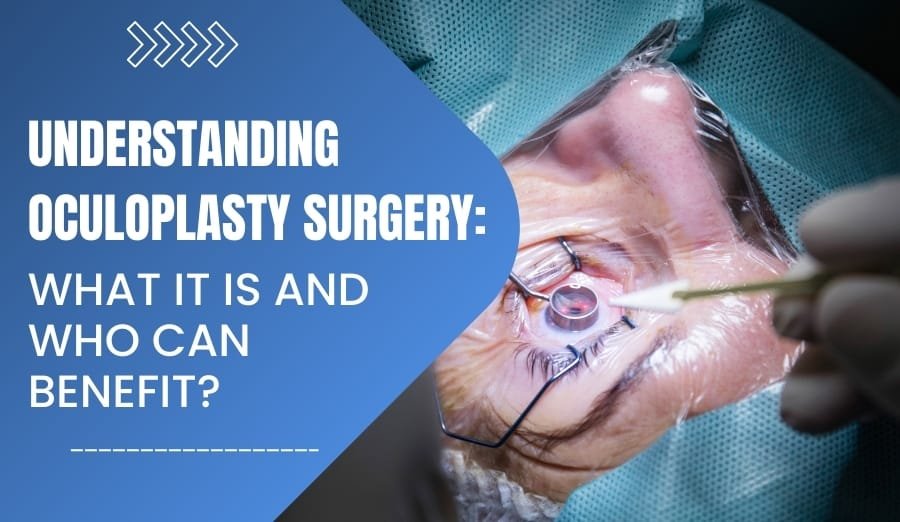-
Pushpanjali Eye Care Hospital, Golpark, Kolkata-700029
Pushpanjali Eye Care Hospital, Golpark, Kolkata-700029

By PushpanjaliEyeCare
21.11.2024
Hello Reader!
Welcome to the blog page of Pushpanjali Eye Care, one of the best eye hospitals in Kolkata.
At Pushpanjali Eye Care, recognized as the best eye hospital in Kolkata, we take pride in offering specialized treatments that cater to various eye-related needs. One such advanced treatment is Oculoplasty Surgery, a branch of ophthalmology dedicated to addressing cosmetic and reconstructive issues around the eyes. Let’s explore what this surgery entails and who can benefit from it.

Oculoplasty Surgery, also known as ophthalmic plastic surgery, focuses on the eye’s surrounding structures, including the eyelids, tear ducts, orbit (eye socket), and facial areas. It combines medical expertise with aesthetic considerations to improve functionality, enhance appearance, or restore damaged areas caused by trauma or disease.
This surgery is performed by trained ophthalmologists specializing in oculoplastic procedures, ensuring a balance between cosmetic outcomes and vision health.
1. Individuals with Eyelid Abnormalities
Conditions like drooping eyelids (ptosis), entropion (inward turning of eyelids), or ectropion (outward turning of eyelids) can impair vision and cause discomfort. Oculoplasty Surgery corrects these issues, restoring both function and aesthetics.
2. Patients with Tear Duct Problems
Blocked tear ducts can lead to excessive tearing, infections, and discomfort. Surgical interventions like dacryocystorhinostomy (DCR) can address these problems effectively.
3. Those with Orbital Issues
Injury, tumors, or diseases affecting the eye socket can require reconstructive surgery to restore structure and function. Oculoplasty Surgery helps manage these conditions with precision.
4. Individuals Seeking Cosmetic Enhancements
For those looking to rejuvenate their appearance, procedures like blepharoplasty (eyelid surgery) can remove excess skin or fat, giving the eyes a youthful look.
5. Trauma and Tumor Patients
Traumatic injuries or tumors around the eye can cause significant damage. Oculoplasty Surgery helps repair these areas, improving both appearance and function.

Oculoplastic surgery addresses various conditions affecting the eyelids, tear ducts, and surrounding facial structures. Here are some of the most common conditions treated with oculoplastic procedures:
This condition involves the sagging of the upper eyelids, obstructing vision and creating a fatigued appearance. Oculoplastic surgery can lift the eyelids, restoring both function and aesthetics.
Conditions such as entropion (inward-turning eyelids) and ectropion (outward-turning eyelids) can lead to discomfort and visual disturbances. Surgical correction realigns the eyelids, enhancing eye protection and overall comfort.
Obstructions in the tear ducts can cause excessive tearing, infections, and discomfort. Oculoplastic procedures such as dacryocystorhinostomy help clear or bypass these blockages, restoring proper tear drainage.
Trauma to the eye socket can lead to fractures that may cause vision problems and facial asymmetry. Oculoplastic surgery reconstructs the orbital bones, restoring functionality and aesthetics.
This condition can cause bulging eyes, double vision, and eyelid retraction. Oculoplastic surgeons work alongside other specialists to manage these symptoms through surgical interventions like orbital decompression or eyelid repositioning.
Eyelid lesions such as cysts or tumors may require surgical removal to prevent complications. Oculoplastic surgeons carefully excise these lesions while preserving eyelid structure and function.
Many individuals seek oculoplasty for aesthetic improvements, including removing excess skin from the upper lids (blepharoplasty) or addressing under-eye bags and sagging eyebrows.
Also Read: Are There Any Dietary Changes That Can Help with Digital Eye Strains?

Recovery from oculoplastic surgery, particularly eyelid surgery (blepharoplasty), varies based on individual circumstances and the specific procedures performed. Here’s a detailed overview of the typical recovery timeline and considerations:

Oculoplastic surgeons treat orbital fractures through a combination of assessment, surgical intervention, and careful post-operative management. Here’s a detailed overview of the process:

As the best eye hospital in Kolkata, Pushpanjali Eye Care is committed to providing cutting-edge solutions tailored to each patient’s needs. Here’s what sets us apart:
Before the procedure, a thorough evaluation is conducted to assess the condition and understand the patient’s goals. This includes:
Following surgery, patients may need to follow specific aftercare instructions to ensure a smooth recovery and optimal results.

1. What is Oculoplasty Surgery?
Oculoplasty Surgery is a specialized procedure focusing on the eyelids, tear ducts, eye sockets, and facial areas around the eyes. It can address both functional and cosmetic issues.
2. Who can benefit from Oculoplasty Surgery?
People with eyelid abnormalities, blocked tear ducts, orbital issues, trauma, tumors, or those seeking cosmetic enhancements like eyelid rejuvenation can benefit from this surgery.
3. Is Oculoplasty Surgery safe?
Yes, when performed by experienced oculoplastic surgeons, it is a safe and effective procedure. Choosing a trusted facility like the best eye hospital in Kolkata ensures optimal care.
4. What conditions can Oculoplasty Surgery treat?
It treats drooping eyelids, tear duct blockages, orbital injuries, tumors, and offers cosmetic procedures like blepharoplasty for a youthful appearance.
5. How long is the recovery process for Oculoplasty Surgery?
Recovery time varies depending on the procedure, but most patients can resume normal activities within 1–2 weeks with proper post-operative care.
Oculoplasty Surgery is a versatile and effective solution for various functional and cosmetic issues around the eyes. Whether addressing a medical condition or enhancing your appearance, this surgery can significantly improve your quality of life.
If you’re considering Oculoplasty Surgery, trust Pushpanjali Eye Care, the best eye hospital in Kolkata, to provide expert guidance and exceptional care. Schedule your consultation today and let us help you see—and look—your best!